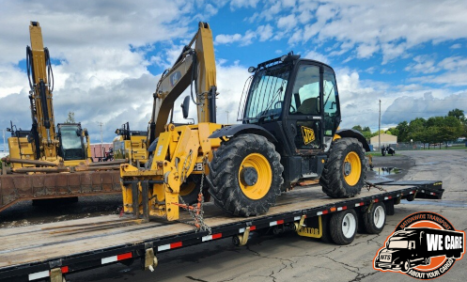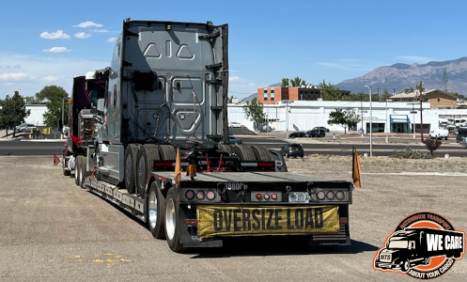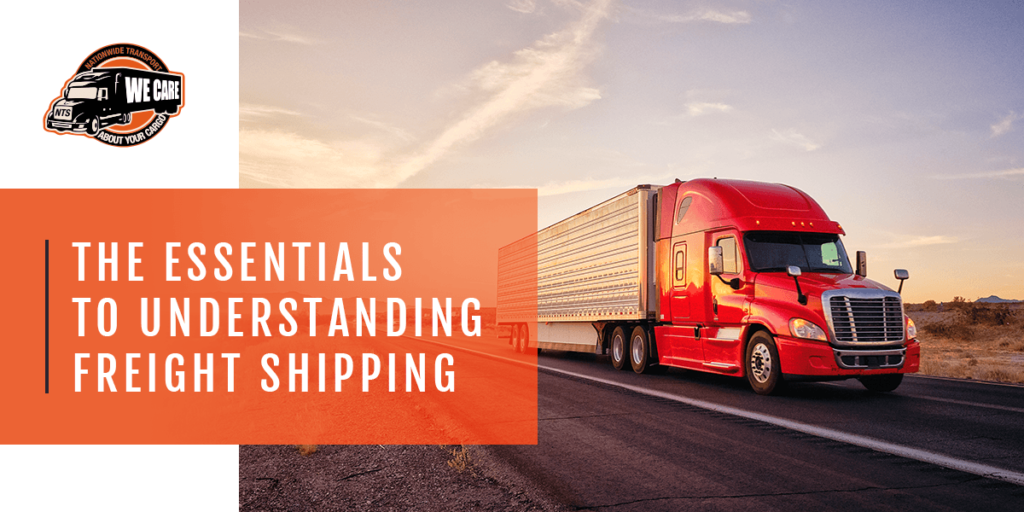
Regardless of your business type, your cargo is precious to you. Making sure that your goods get where they need to be when they need to be there is an important factor in ensuring quality customer care, establishing brand loyalty and increasing sales.
As your business grows, you will need to move more materials, especially if you expand globally. An efficient and reliable way of transporting your goods is through freight shipping. This type of transportation has become a popular method for businesses of all types due to the amount of goods that can be shipped at one time and the speed with which they can move between locations.
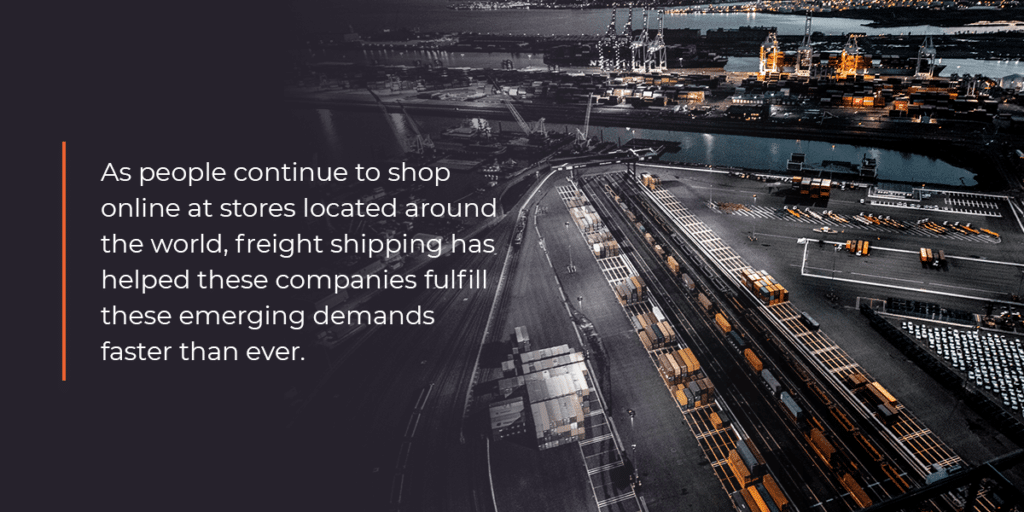
What Is Freight Shipping?
Freight shipping means the transportation of large and bulk commercial goods across land, sea or air. Most of us are already familiar with freight shipping in some way, even if we don’t know the formal definition. Whether we see semi-trucks transporting heavy loads down the highway, live in a port city filled with shipping containers or watch trains pass by with various goods packed into each train car, we often see evidence of freight shipping in our everyday lives.
Moving a lot of materials over any distance can seem like an exhaustive process for any business, but in today’s world, it is much simpler than we may think. Companies like Nationwide Transport Services can assist with this process, leaving you with more time to lead your business towards success.
The term freight specifically refers to the materials shipped using these methods. All types of materials can be moved via freight shipping, including various goods, heavy loads and commodities. Many businesses use freight shipping as their primary method of moving their materials to the locations where they need them, whether that’s across the country or across the globe. These businesses turn to freight shipping because it can be a more cost-effective way of moving products and often works best for the time constraints that businesses tend to experience with the rising demand for their products.
Freight shipping has become the ideal method of transportation for all kinds of businesses, but especially for e-commerce, which is becoming more popular every year. As people continue to shop online at stores located around the world, freight shipping has helped these companies fulfill these emerging demands faster than ever.
Some businesses handle their own freight shipping. However, it’s more common for businesses to hire a third-party company to ship their freight. This is often the best choice as these companies are freight experts when it comes to getting your product from one location to the next.
Popular Freight Shipping Methods
With the growth of business comes the need for various freight shipping methods. Many different shipping solutions are available for different needs or requirements. Picking the right one for your business is key. When picking a shipping method, be sure to consider the cost, time constraints and the amount of cargo being shipped. Understanding the differences between the most popular shipping methods will help you decide which one would be best suited to your needs.
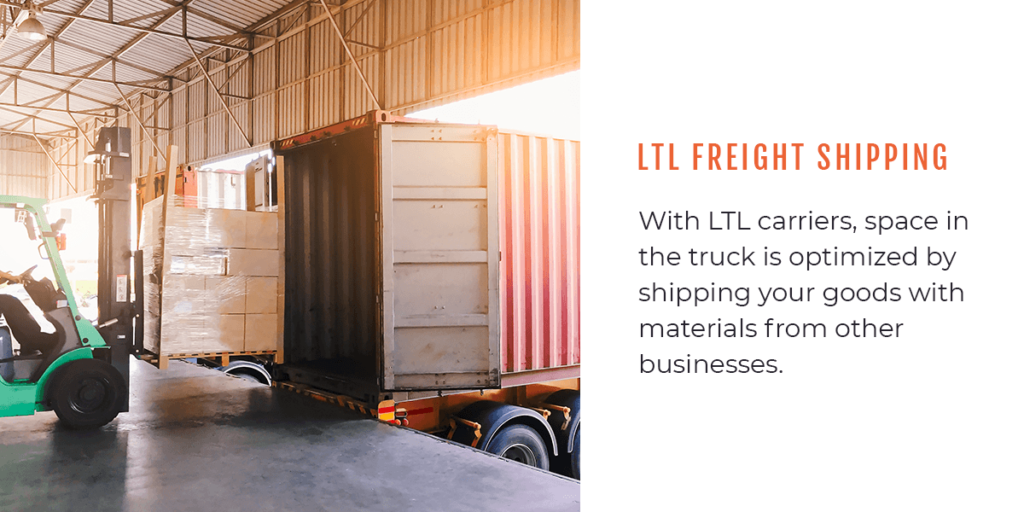
LTL Freight Shipping
Less than truckload (LTL) is a popular method of freight transport by road for businesses that have more goods than a parcel carrier can handle but not enough to require a full truckload. With LTL, companies typically have established minimums and maximums. The maximums ensure that the number of materials you ship doesn’t require another method of freight shipping that would be better suited to your needs. These numbers vary by company but typically land anywhere between 150 to 15,000 pounds.
With LTL carriers, space in the truck is optimized by shipping your goods with materials from other businesses. For example, if you are shipping only two pallets of materials, the shipping company will usually fill the rest of the truck with other LTL shipments from other businesses. Sharing the space with another business means you do not have to pay for the entire truck — just the space your freight shipment uses.
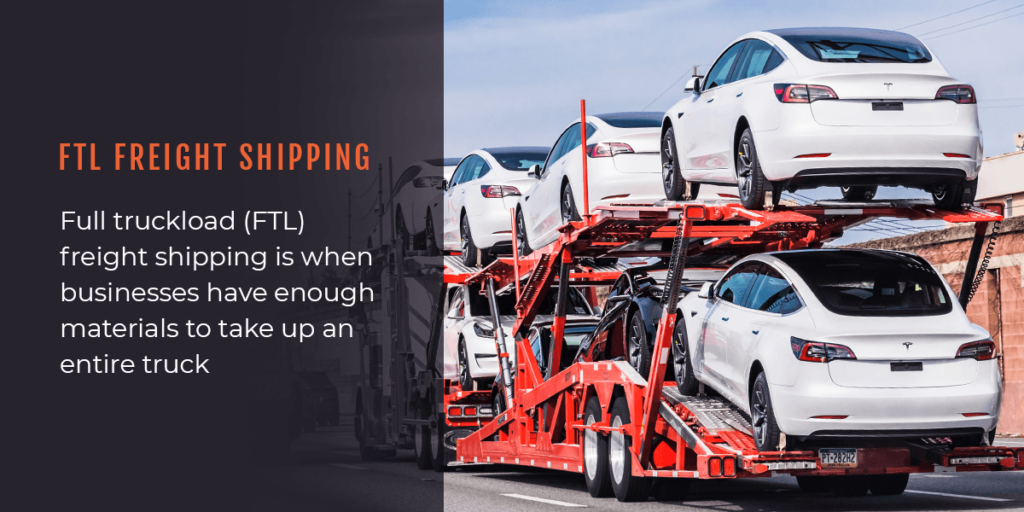
FTL Freight Shipping
Full truckload (FTL) freight shipping is when businesses have enough materials to take up an entire truck. Full trucks can carry up to 45,000 pounds, much more than the weight maximum with LTL shipping services. A standard truck can typically hold 30 pallets, something to keep in mind when deciding which method to use for your business. Some trucks may be able to carry more or less weight or pallets, so it is always best to ask the carrier you are working with to ensure you stay within the appropriate limits.
The advantage of FTL shipping is that deliveries are typically faster than LTL shipments because these freights are transported directly to their destination, rather than making multiple stops for various delivery locations. However, using this method, you would be responsible for the full cost of the truck as opposed to LTL shipping, where you are only responsible for paying for the costs of some of the space. Keeping these costs in mind is important when deciding between using FTL or LTL freight shipping.
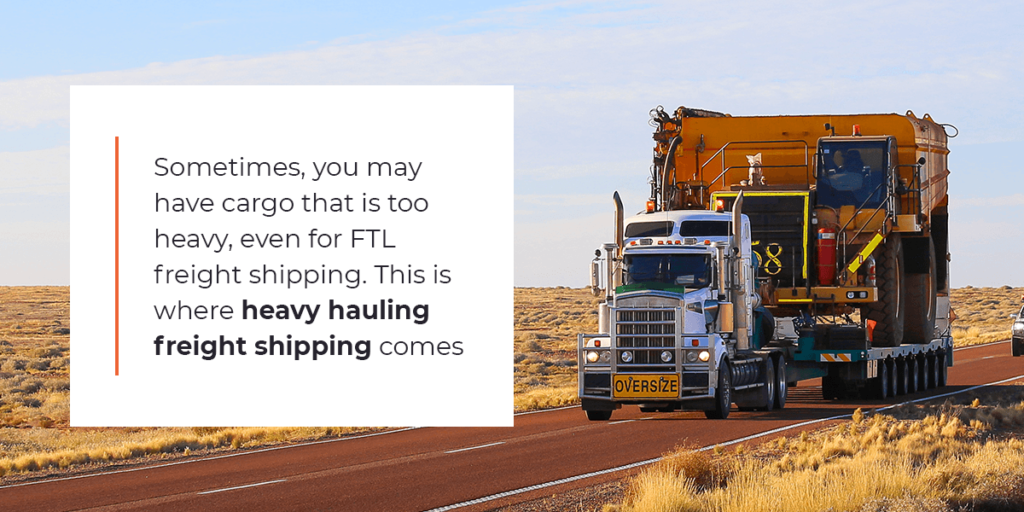
Heavy Hauling Freight Shipping
Sometimes, you may have cargo that is too heavy, even for FTL freight shipping. This is where heavy hauling freight shipping comes in. This method works best when hauling heavy machinery or oversized loads that won’t fit into standard trucks.
Most places in the United States consider a heavy haul to be anything exceeding 45,000 pounds, the typical weight capacity for FLT freight loads. Size also has a lot to do with determining if something is a heavy haul as well. In most cases, anything exceeding a width of 8.6 feet, a height of 13.6 feet, and a length of 53 feet is considered too large for standard shipping and must be done by carriers that accommodate heavy hauling, such as Nationwide Transport Services.
Intermodal Freight Shipping
Intermodal freight shipping is when multiple transportation methods are used to get materials from one location to another. This includes transportation by truck, train, ship or plane. Containers shipped with this method must be a certain size to adhere to guidelines from the International Organization for Standardization (ISO). These guidelines permit materials to remain in the same container throughout the shipping process, so they don’t need to move or switch containers with each new mode of transportation. ISO’s guidelines for intermodal freight shipping also contribute to the industry’s reduced travel costs and time.
Intermodal freight is also typically conducted under multiple contracts with multiple shipping carriers, rather than just one contract with one shipping carrier. Since the materials remain in one container, the number of damaged or lost goods is also greatly reduced, which is one reason intermodal shipping services are so appealing.
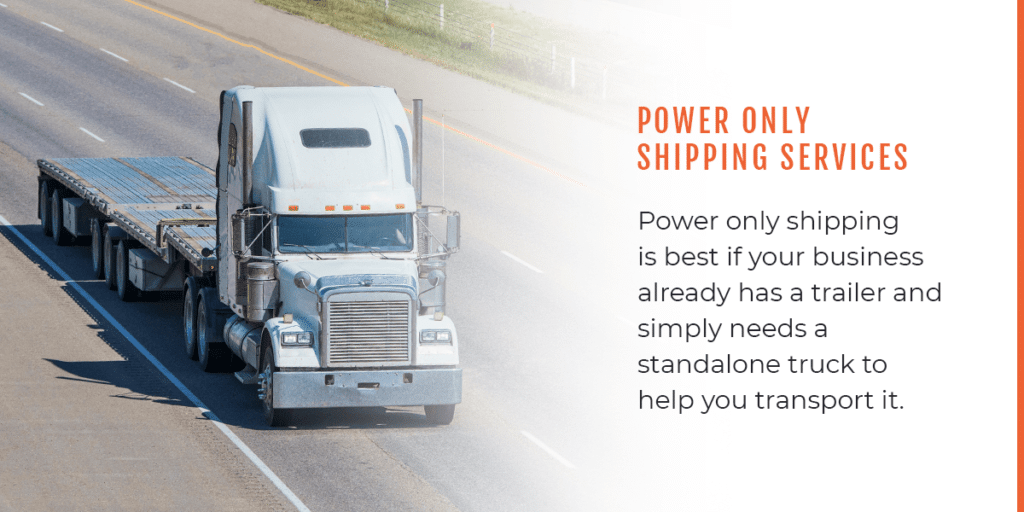
Power Only Shipping Services
Power only shipping is best if your business already has a trailer and simply needs a standalone truck to help you transport it. A semi-truck without a trailer attached comes to your destination to pick up your trailer and move it to your desired location. Some shipping companies will charge more for this type of freight transportation if the traveled distance is greater than a predetermined mileage, such as 500 miles. Power only shipping is an excellent great option if you own your own trailer or move it frequently but don’t want to keep up with the costs of maintaining the licenses required to transport it. Power only shipping also works well if you plan on keeping your trailer in one location for an extended period and need it moved to that location at the best cost to you.
Picking the Right Method
Now that you have a better understanding of how each method works, you can decide which is the best freight shipping method for your needs. Each method has its own benefits, but not every method will be right for each situation. However, there is always a freight shipping method that is right for you.
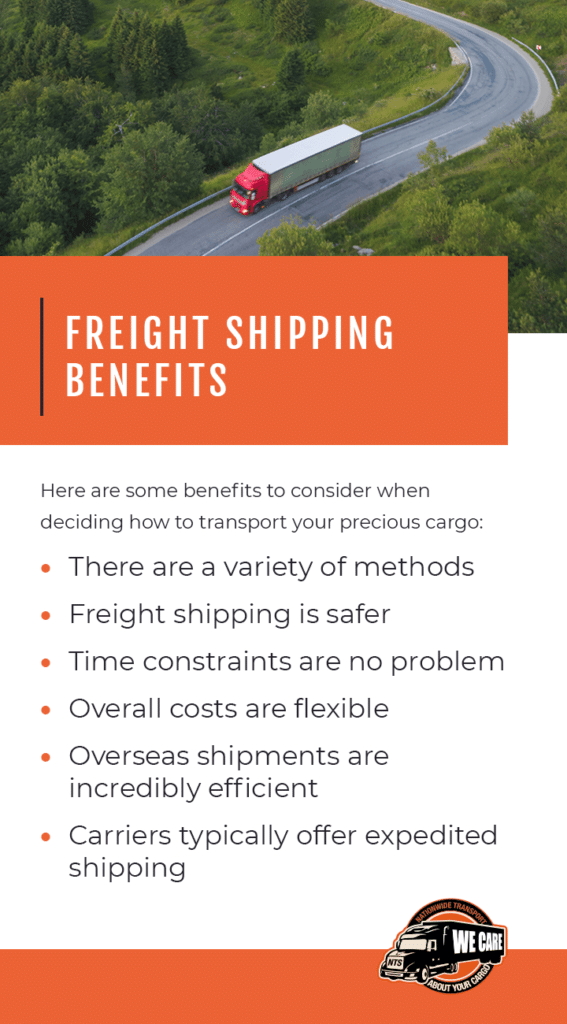
Freight Shipping Benefits
Freight shipping comes with many benefits that make it an advantageous option to businesses and entities. Most freight shipping methods have similar advantages, but some benefits are more applicable to certain shipping methods than others. Here are some benefits to consider when deciding how to transport your precious cargo:
- There are a variety of methods: No matter what you need to ship, there is a method of shipping that is right for you. You aren’t constrained by one or two shipping options that may not fit your specific requirements well. Freight shipping offers the freedom of choice to help make transporting your business’s cargo as easily and effortlessly as possible.
- Freight shipping is safer: Compared to other forms of shipping, freight shipping is much safer than other methods. There is no need to worry about porch pirates when it comes to freight shipping, and robberies are incredibly rare in the industry. The risk of lost items is becoming lower as travel methods get better. Freight on ships or planes is easier to track and locate than ever, and trains have always been a reliable mode of transportation when it comes to moving cargo across large stretches of land.
- Time constraints are no problem: Freight carriers regularly work under tight time constraints and continue to deliver cargo on time and all in one piece. Since you can choose from several methods, there will always be a freight transportation method that can accommodate any time sensitivities. Freight shipping also allows you to schedule shipments in advance, making it easy to meet any potential time constraints that may arise.
- Overall costs are flexible: The price of your shipment will vary depending on which method you choose. This is advantageous for businesses that want more flexibility when it comes to shipping costs. Shipping with LTL will be a cheaper method compared to FTL, and shipping across the sea will be cheaper than by plane. If there are no immediate time constraints, then you can pick the method of shipping that is right for you and fits best within your budget.
- Overseas shipments are incredibly efficient: Transporting oversized loads and heavy equipment is easy with overseas freight shipping. Many ships can carry very large shipments, including cars, large farm equipment and other heavy machinery. There is no shipment too big for an overseas freight shipment.
- Carriers typically offer expedited shipping: Many freight carriers offer expedited shipping, just like parcel carriers. Expedited shipping usually costs extra, but it is perfect for companies working under time restrictions that need to get their freight to their destination as quickly as possible.
With all of these benefits, it is no surprise that freight shipping is a popular method of transporting cargo all over the world. There’s a reason freight shipping has existed for as long as it has and why it is stronger than ever. Freight shipping can accommodate almost any need and can provide a solution that is the right choice for your business’s transportation needs.
Common Freight Shipping Questions
If you’ve never used freight shipping before, you may have a lot of questions, whether it’s about cost or how exactly the process works. Understand what you’re getting into with freight shipping can alleviate any worries. Here are the answers to some of the most common questions people have about freight shipping services.
What Is the Difference Between Shipping and Freight?
Shipping and freight both relate to transporting goods or cargo, but freight is the transportation of larger quantities of said cargo. Additionally, freight shipping also typically refers to commercial shipping rather than personal use. One reason why businesses tend to use freight shipping most often is it benefits them more than standard or parcel shipping.
What Can I Ship With Freight Shipping?
You can ship a wide variety of bulk goods with freight shipping. Many businesses use freight shipping to get their products from their warehouses to their store locations. Construction companies use freight shipping to transport materials and heavy machinery to construction sites and back easily. If you can think of it, you can likely ship it via freight.
In What Ways Can I Ship My Freight?
There are many methods when it comes to freight shipping. The most common ways are LTL, FTL, heavy haul and intermodal. You can pick which method is right for you depending on the size of your business’s shipment, the destination, cost and time constraints. What makes freight shipping so appealing is that there are so many options, meaning you aren’t restricted to just one or two choices when deciding how you want to ship your cargo.

How Much Will My Shipment Cost?
The price of a shipment will vary depending on how you decide to ship your cargo and what exactly you’re shipping. Prices will also change depending on the weight of your cargo, the distance it has to travel and how quickly it needs to arrive.
For example, LTL freight shipping tends to be cheaper than FTL since you don’t pay for the whole truck, but prices can fluctuate based on a few factors, such as how much cargo you have specifically or how far away the destination is. On the other hand, FTL shipping costs are determined differently. Most of the time, rates are applied per mile traveled. Other fees may be applied depending on the company you use. It’s always best to get a direct quote to know approximately how much your freight shipment will cost.
Will I Know Exactly When My Freight Will Arrive at Its Destination?
In most cases, estimated delivery times are not a part of the shipping process. However, if you request a delivery time, the shipping company can typically provide one for you. You don’t need to worry, though, as freight shipping is highly reliable and usually arrives on time.
What Are Freight Classes?
The National Motor Freight Traffic Association (NMFTC) is responsible for creating the standard for the different freight classes known as the National Motor Freight Classification® (NMFC®). There are 18 different classes, which are used to determine pricing for various shipments. These classifications vary from 50 to 500 based on four criteria — stowability, handling, liability and density. These four criteria make up a product’s transportability.

Working With a Specialized Logistics Agent
Working with a logistics agent helps eliminate a lot of the confusion that might arise out of freight transportation. There is a lot of information to absorb and a lot of factors to consider, and it can all seem overwhelming if you’ve never used freight shipping before. An agent can help you organize the complexity into a coordinated operation. A specialized logistics agent within the freight services industry is an expert in the different types of commercial shipping and can help you find the best shipping method for you.
The benefits that come with having a logistics agent are invaluable. A logistics agent can negotiate with different freight companies to ensure you receive what you need to ship your goods on time and on budget. Customers feel heard since agents maintain responsive communication with them regularly and can answer any questions they might have. A specialized logistics agent can also provide customers with freight quotes promptly, helping freight companies retain customers looking for an effective and competent shipper. Greater customer service is always crucial to any business’s success, as happy customers mean increased customer loyalty and sales.
Logistics agents don’t just assist customers, though. They also assist carriers by facilitating the smooth flow of information and keep everything in order. This is valuable to shipping companies that have to handle large freight shipments daily. With a logistics agent managing all important information, such as customer service, timetables or retailer requests, neither freight carriers nor customers need to be concerned. If any issues arise, the logistics specialist is well equipped to handle them.

Let Us Do the Heavy Lifting for You
Freight shipping doesn’t have to be complicated. We know how important your cargo is to you. Now that you understand what freight shipping is and some of the different freight shipping methods, you can begin your transportation journey. If you’re ready to take the next step, let the qualified staff at Nationwide Transport Services help you get started on your freight delivery. Getting a free shipping quote is easy. First, let us know if you’re moving vehicles, freight or a heavy load. Next, give us a few details about your shipment, including where you’re shipping from, where you’re shipping to, when you want to ship, and a description of your load. Finally, provide your contact information, and one of our team members will reach out to you shortly with your custom quote.
If you have any questions about our shipping services, reach out to us today!

